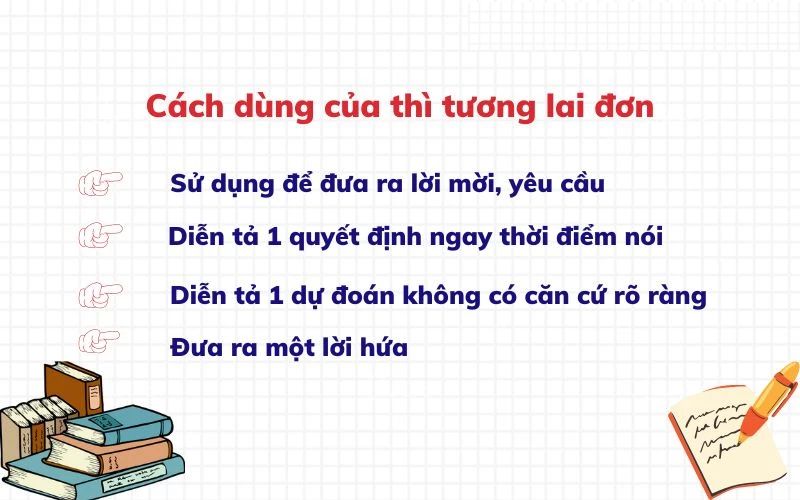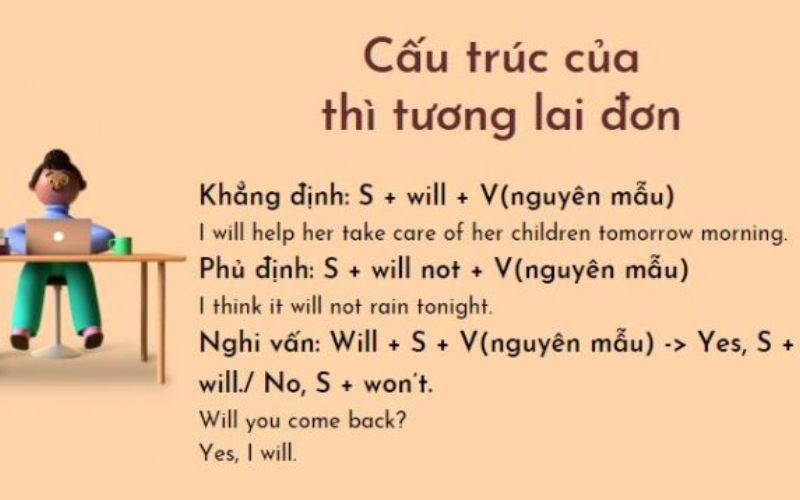Cấu trúc thì tương lai đơn chi tiết nhất
Cấu trúc thì tương lai đơn (Simple Future Tense) trong tiếng Anh là một trong những thì quan trọng để diễn tả các sự kiện hoặc hành động dự kiến sẽ xảy ra trong tương lai. Đây là một khía cạnh quan trọng của ngữ pháp tiếng Anh, mở ra khá nhiều cơ hội để diễn đạt về kế hoạch, dự định và dự đoán về những việc sẽ tới. Tuy nhiên, không phải ai cũng nắm chắc được cấu trúc thì tương lai đơn. Vậy nên, hãy cùng chúng tôi khám phá cấu trúc của chúng để nắm bắt tương lai một cách chính xác và tự tin hơn.
1. Thì tương lai đơn là gì?
Thì tương lai đơn (Simple Future Tense) trong tiếng Anh được sử dụng để diễn tả các hành động hoặc sự kiện dự kiến sẽ xảy ra trong tương lai. Loại thì này thường được sử dụng để nói về kế hoạch, dự định, hoặc dự đoán về những việc sẽ tới.

Cách dùng đối với thì tương lai đơn
2. Cấu trúc thì tương lai đơn
2.1. Câu khẳng định
- Công thức:
- Động từ thường: S + will/shall + V-inf
- Động từ to be: S + will/shall be +…
- Ví dụ:
- Động từ thường: They will travel to France next summer. (Họ sẽ đi du lịch đến Pháp vào mùa hè tới.)
- Động từ to be: She will be a doctor in the future. (Cô ấy sẽ là bác sĩ trong tương lai.)
2.2. Câu phủ định
- Công thức:
- Động từ thường: S + will/shall not + V-inf
- Động từ to be: S + will/shall not + be +…
- Ví dụ:
- Động từ thường: She will not visit us tomorrow. (Cô ấy sẽ không đến thăm chúng tôi vào ngày mai.)
- Động từ to be: She will not be a lawyer in the future. (Cô ấy sẽ không trở thành luật sư trong tương lai.)

Công thức chi tiết thì tương lai đơn
2.3. Câu nghi vấn
- Câu hỏi Yes/No:
- Động từ thường: Will/Shall + S + V-inf?
- Động từ to be: Will/Shall + S + be +...?
- Câu hỏi WH-:
- Động từ thường: WH- + will/shall + S + V-inf?
- Động từ to be: WH- + will/shall + S + be +...?
XEM THÊM: BÀI TẬP THỰC HÀNH THÌ TƯƠNG LAI HOÀN THÀNH TIẾP DIỄN
XEM THÊM: TỔNG HỢP KIẾN THỨC VỀ THÌ TƯƠNG LAI TIẾP DIỄN
3. Bài tập ứng dụng có đáp án
Bài tập 1: Hoàn thành các câu sau bằng cách sử dụng thì tương lai đơn của động từ trong ngoặc
- I believe she (win) the competition.
- They are very talented. They (succeed) in their careers.
- By this time next year, I (graduate) from university.
- We (travel) to Europe next summer.
- If you study hard, you (pass) the exam.
- She is so talented that she (become) a famous artist.
- I promise I (help) you with your project.
- By the time you get back, I (finish) the report.
Đáp án:
- I believe she will win the competition.
- They are very talented. They will succeed in their careers.
- By this time next year, I will graduate from university.
- We will travel to Europe next summer.
- If you study hard, you will pass the exam.
- She is so talented that she will become a famous artist.
- I promise I will help you with your project.
- By the time you get back, I will finish the report.
Bài tập 2: Hoàn thành các câu sau bằng cách sử dụng thì tương lai đơn của động từ trong ngoặc dựa trên kế hoạch cá nhân của bạn
- Next weekend, I (visit) my grandparents.
- In two years, I (complete) my master's degree.
- Tomorrow, I (meet) with my supervisor to discuss the project.
- In a few months, I (start) a new job.
- By the end of this year, I (save) enough money for a vacation.
- In five years, I (buy) a new car.
- This time next month, I (move) to a new apartment.
- Next summer, I (travel) to a tropical island for a holiday.
Đáp án:
1.Next weekend, I will visit my grandparents.
- In two years, I will complete my master's degree.
- Tomorrow, I will meet with my supervisor to discuss the project.
- In a few months, I will start a new job.
- By the end of this year, I will save enough money for a vacation.
6.In five years, I will buy a new car.
- This time next month, I will move to a new apartment.
- Next summer, I will travel to a tropical island for a holiday.
Bài 3: Khoanh tròn vào đáp án đúng
- Which sentence is in the Simple Future Tense?
- She is watching a movie.
- They will travel to Paris next month.
- I have visited that museum.
Đáp án: B.
- What is the correct negative form of "I will go to the party"?
- I not will go to the party.
- I will not go to the party.
- I not going to the party.
Đáp án: B.
- Which sentence uses the Simple Future Tense?
- She is eating lunch.
- They played soccer yesterday.
- He will call you later.
Đáp án: C.
- What is the question form of "She will graduate next year"?
- She graduate next year?
- Will she graduate next year?
- She will not graduate next year?
Đáp án: B.
- Choose the correct sentence in Simple Future Tense.
- I am going to the store.
- I went to the store.
- I will go to the store.
Đáp án: C.
- What is the negative form of "They will arrive on time"?
- They will not arrive on time.
- They will arrive on time?
- They will arrived on time.
Đáp án: A.
- Which sentence is in Simple Future Tense?
- We are watching TV.
- He will study for the exam.
- I had lunch.
Đáp án: B.
- What is the question form of "You will visit your parents this weekend"?
- You visit your parents this weekend?
- Will you visit your parents this weekend?
- You not visit your parents this weekend?
Đáp án: B.
- Choose the correct sentence in Simple Future Tense.
- I am eating dinner now.
- I will eat dinner in an hour.
- I ate dinner an hour ago.
Đáp án: B.
- What is the negative form of "She will be at the party"?
- She not will be at the party.
- She will be not at the party.
- She will not be at the party.
Đáp án: C.
- Which sentence uses Simple Future Tense?
- We have a picnic last weekend.
- They are playing soccer right now.
- I will visit my grandparents tomorrow.
Đáp án: C.
- What is the question form of "They will travel to Europe next summer"?
- Will they travel to Europe next summer?
- They travel to Europe next summer?
- They will not travel to Europe next summer.
Đáp án: A.
Hy vọng rằng qua bài viết này sẽ giúp bạn nắm được rõ hơn về cấu trúc thì tương lai đơn. Chúc bạn học tập thật tốt và đạt nhiều kết quả cao.
Bài viết liên quan




